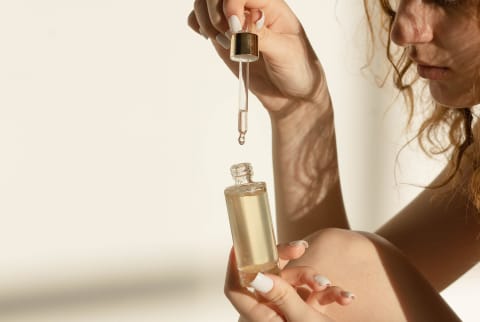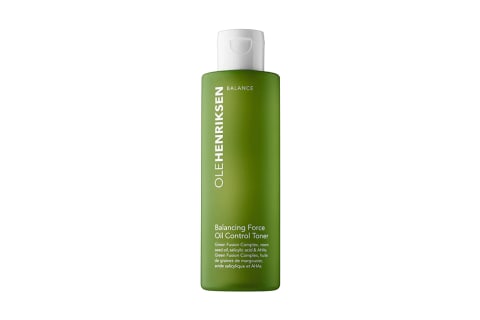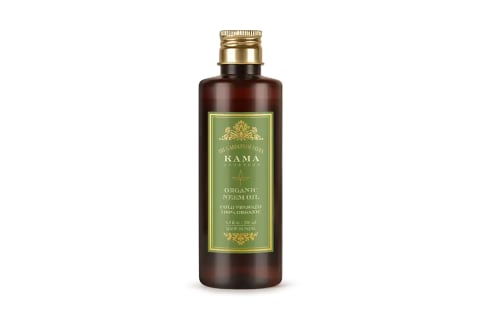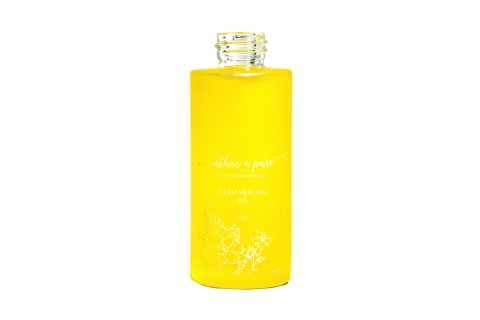Advertisement
Neem Oil Benefits: 5 Skin & Hair Uses + Best Products To Try


Sometimes big beauty missions like stimulating hair growth or clearing breakouts call for more intense treatments than over-the-counter (OTC) products can offer. That being said, it's not unreasonable to start with natural ingredients and work your way up to prescription-strength players, if you choose.
You may even be surprised by the dramatic results some natural efforts can provide! Take, for example, neem oil: This ingredient has been around for centuries and continues to command beauty conversations everywhere. Here's the 101 on this liquid gold, including why you might want to use it and where to find it in products.
What is neem oil?
This nutrient-rich oil, made from the seeds of the neem tree1, has been used for centuries2 as a medicinal treatment; these days, it's still used as a treatment for a variety of skin conditions, from dry skin and wrinkles to psoriasis, eczema, and beyond.
What's more, neem oil can be used as a natural pesticide for houseplants. However, today we're here to discuss its beauty benefits. (But if you're curious, feel free to take a look at this homeowners' guide.)
What is the history of neem oil?
A bit of background: The neem tree produces small white flowers and a yellow-green fruit, and literally every part of the tree has been used for medicinal and therapeutic treatments. The neem tree has so many medicinal uses, in fact (it contains more than 100 pharmacologically active substances), that in India, it's been referred to as "the village pharmacy." It's no surprise, then, that neem oil has been used for hundreds of years in traditional Indian medicine and Ayurveda1.
And in traditional Indian medicine, the neem tree and its byproducts hold a special place. Siddha medicine2 is one of the oldest medical systems in the world, with origins dating back as far as 10,000 B.C., and the first medicinal plant mentioned in ancient Siddha records is—you guessed it!—neem.
During these times, neem was mainly used to protect against smallpox and other infectious diseases2 (it was also used to ward off evil spirits2; clearly, it was pretty versatile).
What are the beauty benefits of neem oil?
Now that you're familiar with neem oil as a whole, let's dive into its beauty-specific benefits:
- Helps ease fine lines and wrinkles
- Hydrates skin
- Treats some forms of acne
- May help ease dandruff
- Supports healthy hair
Helps ease fine lines and wrinkles
In one 2017 study done on hairless mice, topical neem oil helped treat age-related skin concerns3 such as skin thinning, dryness, and wrinkling.
What's more, neem oil increased type I collagen and elastin in the skin—two essential factors that contribute to skin aging at its core.
Plus, it's protective: "Neem oil is also rich in antioxidants, which means that it can help protect the skin from damage from free radicals," board-certified dermatologist Hadley King, M.D., tells mbg. This function is crucial, as free radical damage can throw your skin into a state of oxidative stress.
Prolonged oxidative stress speeds up the skin aging process4. Specifically, it contributes to the loss of collagen and elastin fibers, resulting in fine wrinkles, sagging, and textural changes. It can also trigger dark spots and other discoloration
Deeply hydrates
"Neem oil is rich in triglycerides and fatty acids—these are emollients that help to support the skin barrier," King says. This makes neem oil a great addition to any moisturizer or face oil, essentially boosting its hydrating power.
More specifically, fatty acids support the skin's lipid barrier, which reduces water loss, soothes discomfort, and bolsters suppleness. Consider fatty acids a must-have in topical hydrating products.
Treats some forms of acne
"Neem oil is great for breakouts," clean cosmetic chemist and founder of KKT Consulting Krupa Koestline tells mbg. "Neem oil, in addition to the various omega fatty acids, also contains nimbin and azadirachtin, which have antiseptic, antifungal, antipyretic, and antihistamine properties. They, therefore, help reduce inflammation, redness, and swelling." Especially for those with sensitive and acne-prone skin, neem oil can be a gentle treatment that won't exacerbate flushing.
"It also prevents future breakouts by eliminating acne-causing bacteria, purging impurities, tightening the pores, and evening out skin tone," Koestline adds. This is because the oil is shown to have antibacterial properties5, too.
Neem oil may even provide benefits for post-acne scarring. "By softening the skin to make it supple, it facilitates the healing of scars and reduces their look and feel," Koestline says. Research seconds this notion: In one 2013 in vitro study, researchers deemed neem oil an effective long-term treatment for acne6.
However, acne is a complex skin condition with many different causes, including hormonal imbalances, genetics, and more. For this reason, it's a good idea to view neem as a potentially helpful supporting ingredient, but it likely won't clear stubborn cystic or hormonal breakouts on its own. It's always best to visit a dermatologist for those deep, inflamed lesions.
May help ease dandruff
"Neem oil contains nimbidin, which may have anti-inflammatory properties that could make it helpful for inflammatory scalp processes, such as dandruff or psoriasis," Koestline says.
What's more, one small 2012 study found that neem oil helped heal surgical wounds on the scalp7, further confirming neem's ability to aid in overall skin health.
It's important to note that dandruff is technically a form of eczema, which means it cannot be completely cleared with topical remedies (sorry to say: Dandruff has no cure). However, ingredients like neem can help manage the flakes and discomfort that may come along with dandruff.
Can make your hair healthier
Many fatty-acid-rich oils are top-notch for your scalp and strands, and neem oil is very much included in that list.
But in terms of hair growth in particular, the jury's technically still out: "There are no direct scientific studies that link hair growth to neem oil, but since neem oil contains a lot of scalp-beneficial omegas, it helps with overall hair and scalp health," Koestline says. And as a general rule: Healthy hair grows way faster.
Why more research is needed
Neem oil has promising benefits, but the research is still fairly limited compared to other topical ingredients. Especially for skin conditions such as eczema and acne, it hasn't been shown to be the most effective ingredient on the market.
As for hair growth, again, neem oil lacks concrete evidence. It can help with overall hair and scalp health, and caring for those follicles is crucial for faster growth, but we're still lacking some data for hair growth in particular. Rosemary oil will be a better option for that specific goal—you can read all about it here.
However, using neem oil is a great launchpad for treating these conditions. If it works for you, then of course you should keep using it. It's not an end-all-be-all if it doesn't, though—so give yourself some grace if it's not the right fit.
In terms of acne, there are plenty of other options out there. You can read up on potentially helpful ingredients here, and consult a dermatologist if you're struggling to find OTC products that work for you.
The same goes for eczema, as this condition is highly complex and may be difficult to treat with one ingredient alone. For some of the best OTC products out right now, check out this curated list.
How to use neem oil in your routine
How you use neem oil is critical to reap the potential benefits. As stated above, this botanical ingredient is very potent, so you shouldn't use it on its own for full-face or full-scalp care. You can either buy a pre-formulated product (a few A+ options below) or make your own oil-serum solution at home.
"I prefer to dilute neem oil with a carrier oil, like grapeseed, jojoba, coconut oil, or sunflower oil," holistic esthetician Tammy Fender tells mbg. "But it can be used undiluted as a spot treatment," she adds. The carrier base may also help ease the strong scent of the neem seed oil, if you have a sensitive nose.
Choose your base
You can choose any carrier oil you like. If you're using neem oil for the skin, it's best to use a noncomedogenic option like one of these:
- Jojoba oil
- Rosehip seed oil
- Hemp seed oil
- Primrose seed oil
- Sea buckthorn oil
- Grapeseed oil
- Tamanu oil
However, for scalp treatments, you may also consider a thicker oil, like coconut oil.
It's better to place neem oil with a simple carrier oil rather than mixing it into a skin or hair serum you already have. This way, you'll avoid potential chemical reactions or destabilization.
Select a bottle
To make the process easier, you may consider mixing your neem oil with the base and placing it in a clean and empty spray bottle or dropper. Put equal parts neem and carrier into your container and give it a good mix.
Apply to skin or hair
Once you're prepped and ready, apply the DIY cocktail to your skin or scalp. Use it as you would any serum, placing just a few drops in your hands and patting it onto the skin, or giving the scalp a light mist.
Remember to use this oil-serum as a last step in your topical skin care routine. Oils like those listed above have an occlusive function, which means they lock moisture into the skin and act as a barrier. This is great for preventing dryness, but it's not the best first step, as your other products may not penetrate the skin quite as deeply.
Cautions
With any botanical product, it's always best to patch-test the ingredient. Choose a spot on your forearm and apply the product there rather than straight on the face. If that patch becomes red, itchy, or inflamed within 24 hours, then you might have a sensitivity to neem oil and thus shouldn't continue use.
As always, it's best to consult a dermatologist before committing to a new ingredient. Given your unique skin type, goals, and concerns, your dermatologist may give you the green light or suggest you try something else.
Best neem oil products
FAQ
What is neem oil good for?
Neem oil has plenty of potential benefits. This oil may help reduce fine lines and wrinkles, treat some forms of acne, deeply hydrate your skin, and even help ease dandruff.
Can I apply neem oil directly on skin?
You should not apply neem oil directly on the skin. This ingredient is extremely potent, so it's best to mix equal parts neem oil with another carrier oil such as jojoba, grapeseed, etc.
Can neem oil regrow hair?
"There are no direct scientific studies that link hair growth to neem oil, but since neem oil contains a lot of scalp beneficial omegas, it helps with overall hair and scalp health," Koestline says.
The takeaway
At the end of the day, neem oil holds promising benefits for the skin. It may be a helpful tool for treating acne, easing fine lines and wrinkles, deeply hydrating the skin, and reducing dandruff flakes. Just always remember to mix equal parts neem oil with a carrier base like grapeseed or jojoba oil. And if you're looking for other ways to reduce breakouts but don't know where to start, this guide can help.
7 Sources
- https://www.ncbi.nlm.nih.gov/books/NBK234637/
- https://www.ncbi.nlm.nih.gov/pmc/articles/PMC3695574/
- https://www.sciencedirect.com/science/article/abs/pii/S1011134416303323
- https://www.ncbi.nlm.nih.gov/pubmed/25906193
- https://www.ncbi.nlm.nih.gov/pmc/articles/PMC9195866/#:~:text=Virtually%20all%20parts%20of%20the,to%20be%20susceptible%20to%20A.
- https://www.sciencedirect.com/science/article/pii/S2221618913601444?via%3Dihub
- https://pubmed.ncbi.nlm.nih.gov/22584740/


